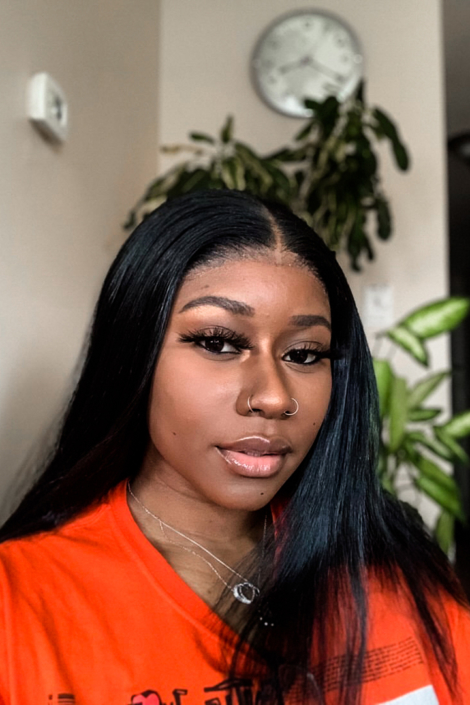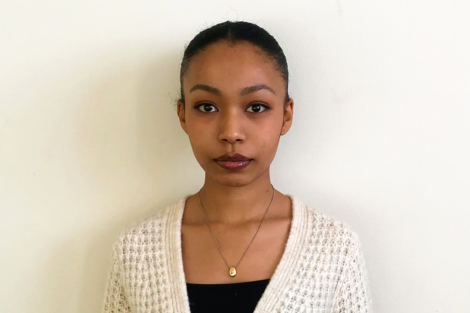DajahRai Green
A Guyanese-Jamaican student in the Faculty of Arts and Science (FAS), DajahRai Green is known as @dajahraiii on TikTok, and she places emphasis on Black history in our education system. “So many of our black history teaching from elementary to highschool focuses on a handful of the same black activists and a brief glimpse of what slavery was,” Green wrote in an email to The Varsity.
“Black History Month is about more than past injustices that repeat themselves today; it’s also about the way black people are currently changing the world… so the future generation can have a better history that is not centered around racialized trauma.”

COURTESY OF DAJAHRAI GREEN
Danielle Clayton
Following the same theme of education, Jamaican-St. Vincentian student Danielle Clayton refers to her personal experiences of Black History Month (BHM) prior to university. “When I was younger I didn’t really understand black history month because all we talked about was slavery… and a small common group of black people who did great things but it was always the same people talked about every year,” Clayton wrote in an email to The Varsity. “When I got to look at the differences in cultures and stories and experiences within the black community, I realized how beautiful we are.”
The notion ‘Black struggle’ is often mentioned when speaking about the Black community. Although it is important to recognize the intergenerational impact of colonialism, this narrative may conceal the achievements of Black people and their successes. Reflecting this, Clayton wrote, “I see black history month as a way to showcase [the Black community’s] greatness… and to come together in cases that are not solely based on tragedy and struggle. Don’t get me wrong, this struggle is still very prominent and does exist and is something that needs to be dealt with so black history month does provide a platform to showcase this but thatʼs not all it is. Thatʼs not all we are.”

COURTESY OF DANIELLE CLAYTON
Dania Asahi Ogie
A FAS student of Japanese-Nigerian descent, Dania Asahi Ogie wrote to The Varsity in regard to celebrating this month: “Black history month is about recognizing the challenges that black people have faced, and still face today. It’s about honouring the challenges that they’ve overcome… Black history month is a time to celebrate the rich history of the African diaspora.”

COURTESY OF DANIA ASAHI OGIE
Zimman Yousuf
A Somali Rotman Commerce student in her second year, Zimman Yousuf highlights her presence as a Black student on campus, writing in an email to The Varsity, “I think coming to U of T was a great decision. To be surrounded by Black excellence has been motivating and uplifting and makes you want to do better as a person. Seeing student organizations such as Black Rotman Commerce go on to host the Black Career Conference goes to show you how much talent the community has.

SAMANTHA YAO/THE VARSITY
Andrea Peel
In an email to The Varsity, Andrea Peel, a senior undergraduate student from Zimbabwe, quoted one of her favourite poems by Marianne Williamson titled “Our Deepest Fear”: “Our deepest fear is not that we are inadequate. Our deepest fear is that we are powerful beyond measure.”
For Peel, the month of February should not be the only time when Black people deserve respect — rather, they should be treated with respect all year. “During BHM, we are encouraged to consider the impacts of Black people in North America and across the globe. I reckon that this is something that should take place every day. The media and modern day systems around us constantly tell black people ‘who are you to be brilliant, gorgeous, talented, fabulous?’ But I say, ‘who am I or rather who are WE not to be?”
Ethnic diversity in any environment is important, especially in academia. In a classroom where students of different backgrounds are able to share each of their unique experiences, we as students are offered the chance to view the world from different perspectives.
At the University of Toronto, the presence of Black students goes far beyond just being a minoritized group. “My attendance at UofT is more than just another diversity statistic. My attendance at UofT is proof of black excellence. Proof that black [people] can and continue to succeed in the country’s leading post-secondary institution,” Peel wrote. “Black people are intelligent and innovative and have Boundless in their potential.”

COURTESY OF SORRY.NOSIGNAL VIA INSTAGRAM
The role of non-Black students
Moving forward, what can we do as non-Black students to celebrate Black excellence? Green suggested, “The best things non-black students can do to celebrate Black History Month is to support black business and communities local to them… stay educated on racial injustices even when the hashtag isn’t trending.” Peel recommended, “Continue to stand in [solidarity] with Black people. Put aside performative activism and genuinely educate yourself. Be the change that we are fighting so [sic] see.”
BHM is not just 28 days of recognition. The personal stories and opinions of these featured individuals indicate common themes of education, solidarity, and why representation of Black success in mainstream media is important. BHM is not simply about recognizing history — itʼs about working toward making history.


